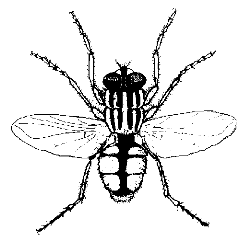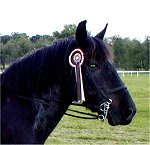|
 DEFRA
has confirmed that equine infectious anaemia (EIA) has been detected
in two horse, one in Northumberland and one in Devon. While the
horse in Northumberland had recently been imported, along with
another five, from the Netherlands the one in Devon had been
in this Country for two years. DEFRA
has confirmed that equine infectious anaemia (EIA) has been detected
in two horse, one in Northumberland and one in Devon. While the
horse in Northumberland had recently been imported, along with
another five, from the Netherlands the one in Devon had been
in this Country for two years.
Chief Executive for the charity World Horse Welfare Roly Owers
speaking about the Northumberland case said: "The news is
extremely concerning and demonstrates the changing environment
we're living in. This is a real warning to us that we're sailing
far too close to the wind. The concerning question is where these
horses came from given that Holland to date has not reported
a case of EIA. With more and more horses moving across Europe,
including the significant trade in low value animals, not just
slaughter animals, we're facing an increasing threat from the
spread of disease."
EIA is endemic in both Romania
and Italy; Romania being one of the largest exporters and Italy
being the largest importer of horses for slaughter in Europe.
In spite of the legal requirement
for health certification before exporting horses from Romania
there continues to be cases of EIA across Europe.
Three horses with EIA, which
were thought to have been imported illegially from Romania, were
recently found in Germany.
|
What is even
more worrying is that the infected animal in Devon was imported
two years ago but only became ill very recently, raising concerns
it could have contracted the virus in this country |
However what is even more worrying
is that the infected animal in Devon was imported two years ago
but only became ill very recently, raising concerns it could
have contracted the virus in this country.
Horse owners have been advised to be on the look out for the
viral infection, which causes intermittent fever, anaemia, emaciation
and death. It can be transmitted by the exchange of blood by
biting insects and occurs typically in low-lying swampy areas
Rigorous checks should also be
undertaken when buying a horse from abroad and to think twice
before importing one from Romanian. Horses and ponies should
be checked to ensure that they have a passport, are microchipped
and that isolation and biosecurity measures are strictly followed
once the animal arrives in this Country.
For further information and advice
visit
http://www.defra.gov.uk/foodfarm/farmanimal/diseases/atoz/eia/index.htm
|


 DEFRA
has confirmed that equine infectious anaemia (EIA) has been detected
in two horse, one in Northumberland and one in Devon. While the
horse in Northumberland had recently been imported, along with
another five, from the Netherlands the one in Devon had been
in this Country for two years.
DEFRA
has confirmed that equine infectious anaemia (EIA) has been detected
in two horse, one in Northumberland and one in Devon. While the
horse in Northumberland had recently been imported, along with
another five, from the Netherlands the one in Devon had been
in this Country for two years.